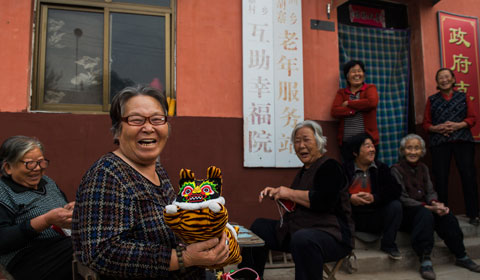UN films highlight rise in HIV cases among women
Updated: 2013-10-23 07:09
By Wang Qingyun (China Daily USA)
|
||||||||
The number of women living with HIV is on the rise both globally and in China, suggesting the need to improve women's rights, UN Women urged during a documentary film screening for medical experts, government officials and NGO activists on Tuesday.
The UN group dedicated to gender equality and the empowerment of women showed three documentary films in Beijing to improve HIV awareness and education.
Two of the films were profiles of Chinese women living with HIV, and the third was about how female sex workers protect themselves from the virus.
Guo Ruixiang, program coordinator for the organization, said UN Women hopes the films will prompt people to think about gender inequality and how it facilitates the transmission of HIV.
A survey by the National Center for AIDS/STD Control and Prevention conducted in Yunnan, Sichuan, Henan, Guangxi and Chongqing in 2012 showed an increase in the number of cases of transmission between sex partners, most of which were from husband to wife.
An earlier survey conducted by the center showed more than 30 percent of women living with HIV got the virus from their husband, while only 9 percent of HIV-positive men said they got it from their wife.
Physiologically, women are more likely to catch the virus during sex with a man than the other way round. However, inequality is another reason why more women get infected this way, said Guo.
The center's study also showed that 31.6 percent of women whose male spouses are HIV-positive said they were forced by their partners into having sex in the past year, and it is usually the male partner who has a say in whether to use a condom.
"For example, there are men who seek sex services while working as migrant workers outside their hometown, contract the virus and pass it on to their wives, as the latter don't ask them to use a condom," she said.
Guo added that the risk to women is further increased by that fact that some Chinese women don't ask their husbands to use a condom.
"Also, many men who have sex with men have married women because they are pressured by tradition to carry on their family's name. This again heightens the possibility of women getting infected," she added.
On the other hand, low-income female sex workers should get special attention in the fight against HIV among women, according to Lan Lan, a leader of Tianjin Xin'ai Female Sex Workers' Home, an NGO focusing on health education and intervention for low-income female sex workers.
Lan said her group cooperates with a local center for disease control and prevention to provide blood tests for female sex workers and trains them on how to protect themselves during their work, including how to avoid violence and how to persuade their customers to use protection.
"But if a sex worker refuses a client who does not want to use protection, she may lose the income to pay for her rent or raise her family. Also, a condom in their room can be evidence to the police (that they are selling sex)," she said, suggesting that many don't follow what they're taught in the training courses.
"They usually live where migrant workers cluster. They are hidden and scattered, thus are hard to find or help," she added.
"Some of them also think the disease is 'foreign' and not relevant to them."
Guo, from UN Women, said: "Though the Chinese government has done a lot in training sex workers to protect themselves, more than 60 percent of them say they are not able to use a condom every time they offer sex services."
wangqingyun@chinadaily.com.cn
(China Daily USA 10/23/2013 page4)
 Pumpkin fun ahead of Halloween
Pumpkin fun ahead of Halloween
 Weakening Raymond soaks Mexico, no serious damage
Weakening Raymond soaks Mexico, no serious damage Apple unveils new Macs, iPad ahead of holidays
Apple unveils new Macs, iPad ahead of holidays
 Smart cities to aid urbanization
Smart cities to aid urbanization
 In control & breaking the mold
In control & breaking the mold
 Higher retirement age may help solve pension problem
Higher retirement age may help solve pension problem
 Northeast remains shrouded in smog for third straight day
Northeast remains shrouded in smog for third straight day
 Beijing Opera troupe perform in Brazil
Beijing Opera troupe perform in Brazil
Most Viewed
Editor's Picks

|

|

|

|

|

|
Today's Top News
NASA: Chinese scientists are now welcome
Yingli uses US baseball stars in campaign
Top officials promote new relations
China's US Treasury holdings hit six-month low
Graduate looks at kung fu-hip hop connection
Apple unveils new Macs, iPad
San Francisco train service restarts after strike
China, Russia reach big oil deal
US Weekly

|

|







